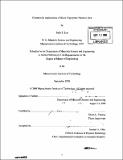Commercial applications of block copolymer photonic gels
Author(s)
Lou, Sally S
DownloadFull printable version (14.35Mb)
Other Contributors
Massachusetts Institute of Technology. Dept. of Materials Science and Engineering.
Advisor
Edwin L. Thomas.
Terms of use
Metadata
Show full item recordAbstract
Block copolymer photonic gels are a simple and easily processed material which responds rapidly to environmental stimuli through a color change. The diblock copolymer that forms the gel self-assembles into a lamellar structure that has the potential to reflect light over a broad range of wavelengths, from the IR to the UV. Application of a stimulus causes a change in the periodicity and/or index of refraction of layers that result in a shift of the stop band. The types of stimuli include temperature, pressure, pH, electric field, salt concentration, and humidity. Due to the high level of tunability of the polymers, it is possible to tailor the response of the gel to achieve a desired effect. This thesis is an assessment of the commercial applications of the photonic gel technology. First a cost model was developed for the polymerization of the block copolymer, polystyrene-b-poly(2-vinyl pyridine). The results indicate that it is cost effective to invest in a small scale production facility at large production volumes. Next, an evaluation of three potential markets was conducted. The anti-counterfeit market is most promising because of large profit margins and the opportunity for future company growth through R&D of new anti-counterfeit measures. The other two markets in color cosmetics and food preservation present potential opportunities for licensing.
Description
Thesis (M. Eng.)--Massachusetts Institute of Technology, Dept. of Materials Science and Engineering, 2008. Includes bibliographical references.
Date issued
2008Department
Massachusetts Institute of Technology. Department of Materials Science and EngineeringPublisher
Massachusetts Institute of Technology
Keywords
Materials Science and Engineering.